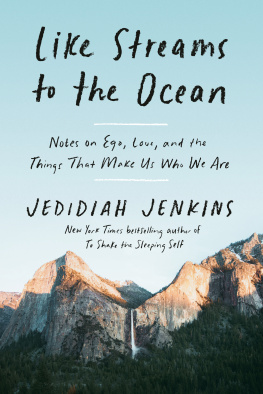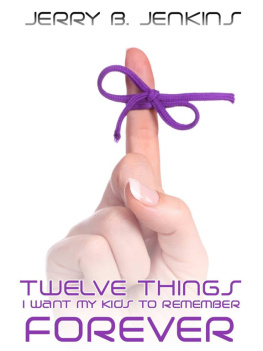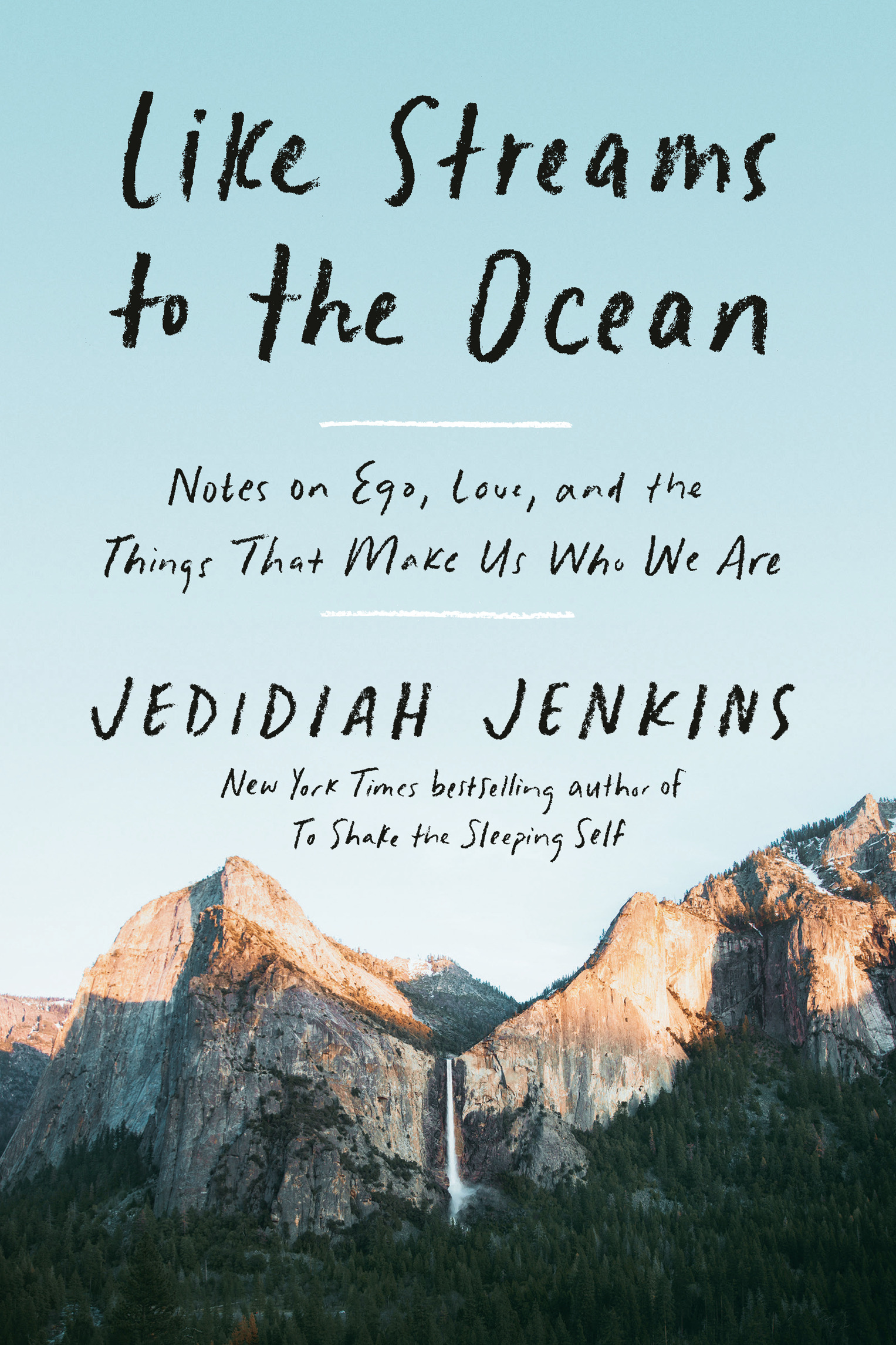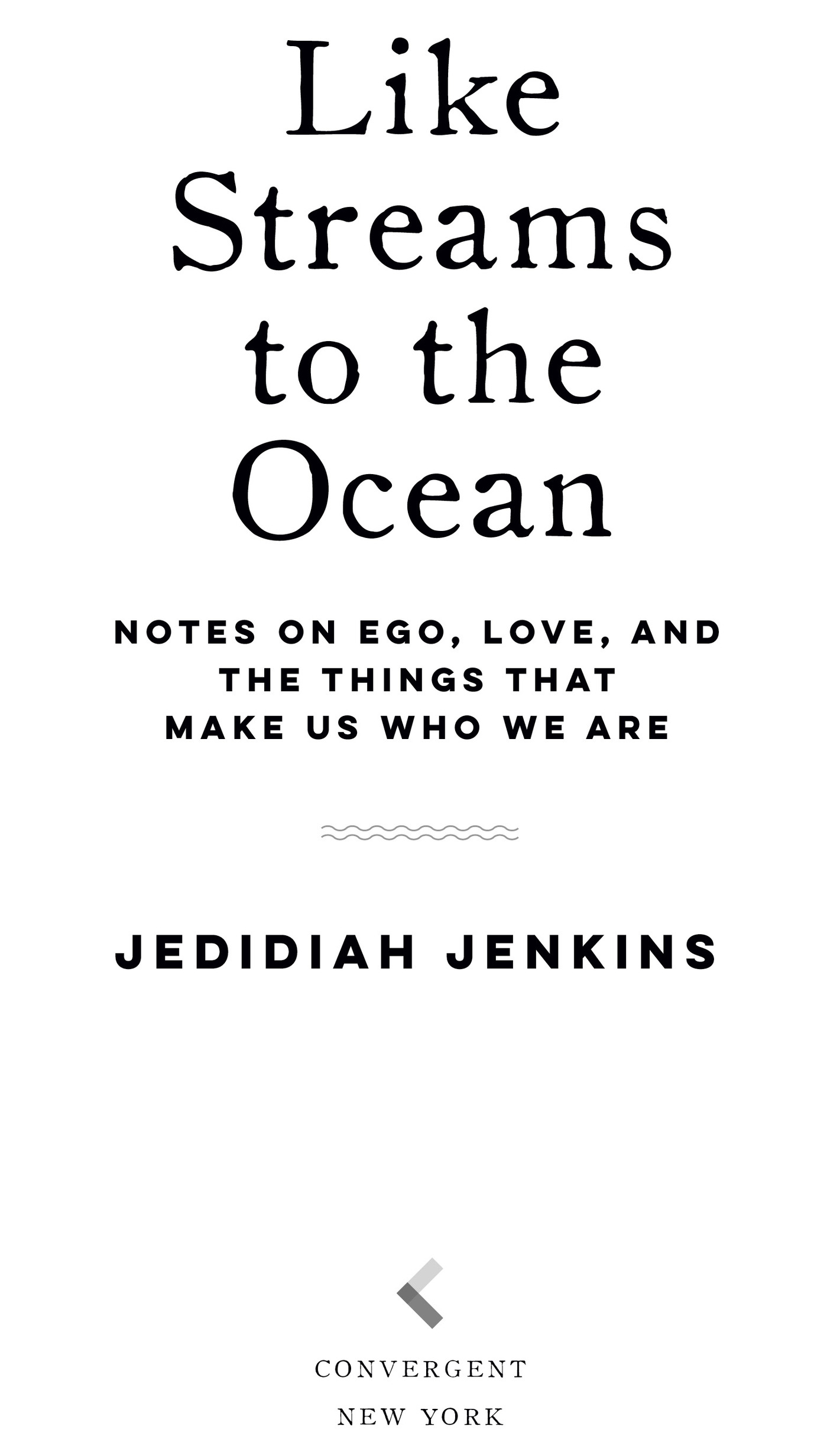All rights reserved.
Published in the United States by Convergent Books, an imprint of Random House, a division of Penguin Random House LLC, New York.
C ONVERGENT B OOKS is a registered trademark and its C colophon is a trademark of Penguin Random House LLC.
Names: Jenkins, Jedidiah, author.
Title: Like streams to the ocean: notes on ego, love, and the things that make us who we are / Jedidiah Jenkins.
Identifiers: LCCN 2020012014 (print) | LCCN 2020012015 (ebook) | ISBN 9780593137239 (hardcover) | ISBN 9780593137246 (ebook)
Subjects: LCSH: Jenkins, Jedidiah. | Introspection. | Self. | Self (Philosophy) | Conduct of life.
Introduction
Sometimes I wish I could stop thinking and exist in the full contentment of an animal. I envy the staring of a lizard, how it sits in the sun and looks out onto the world. It is not worried about things it can imagine. It is not smiling. It is not happy at its contentment. How could it be? It doesnt know discontent. If it is scared, it is scared for a reason, for a danger it can sense and see. It is not imagining what could happen ten years from now. Its mind is perfectly present. Free.
But we are not like that. We are conscious. We are self-aware. We have a triad of worlds inside us: our mind in the present, our mind holding the past, and our mind guessing at the future. Our consciousness unites these things in a mysterious and muddled way. It feels things it cannot explainurges and sadness and lusts without names. We have to sort out these many longings and instincts, or live in anxious confusion.
For a sentient unicorn such as you or me, the unexamined life is a curse. It leaves the mind at the mercy of the gut, cluttered with confusing information coming from below. Who we are cannot be fully realized until we tidy up the room and see whats under all those piles of clothes.
The summer before my first book came out, I got very sick. I had a 105-degree fever. At night, I soaked the bed with so much sweat that I started sleeping on six towels, peeling them away when they became unbearably soggy. Over two months of this, I lost twenty-five pounds. I went to the hospital ten times and had enough blood drawn to deflate a whale. They couldnt figure out what was wrong with me.
The illness came at the worst possible time, in the ramp-up to the release of my memoir. In the book, I had written about my struggle to be a good church kid from Tennessee in a family who loved me but thought being gay was a death sentence. For weeks, I had been going back and forth with my mother about things she didnt like in the book. Things she thought were unfair representations and caricatures. When she confronted me, it led to an exchange of no-holds-barred emails, in which I spelled out my homosexuality, the dismantling of my faith, and the new boundaries I needed to set with her. Much of it for the first time. She was willing to listen, but wounded, and she wrote with a firmness in what her faith said about me. By the end, I basically told her I was prepared to walk away from the family.
I remember shaking as I typed those emails. I love no one more than I love my mother, which is why she can rock me and warp my spine. I knew I had a story to tell, one that Id desperately needed to read when I was younger. But the book was about to blow up my relationship with my family, and now my body was falling apart.
My mystery illness reminded me of a universal truth: It is good to have a doctor for a friend. Toby is that doctor for me. I met him in San Francisco through my old roommate and reveled in his stories from the hospital. Hes worked in the emergency room for years, and my god, the things he has seen. The things people stuff into their bodies orifices are impressively varied (ex: a dead crow, because it was cold). Tobys experiences in the ER have made him calm and rational at all times.
After my fever had kept me up for two full weeks, I texted Toby. He told me to get my blood tested. Maybe it was Lyme disease. After the third week, he said, This is odd, most fevers are gone after two weeks. I kept getting more blood tests, stool tests, urine tests. Negative. Nothing. I was as healthy as an athlete, except for the fact that I was too weak to walk to the bathroom. At six weeks, Toby no longer sounded calm and collected. He was worried, tired of my local doctors not taking this seriously. He told me to go to the ER. If I told them Id been having chest painwhich was true by thenthey would fast-track me to see the doctor.
I poured myself into an Uber and hobbled into the ER. The doctor looked at my most recent test results with a furrowed brow. You could have testicular cancer, he said, looking up from the sheet. Drop your pants please so I can check.
Cancer?
Yes. The fever could be your bodys way of trying to cook it and kill it.
Wow. I had thought I had a flu, maybe, or Lyme disease. Cancer never crossed my mind. I stood up and pulled down my pants and underwear. The doctor felt around while I braced to hear words that would change my life.
I feel nothing; thats good. But you could still have cancer. Let me order you a CT scan.
I went home buzzing with mortality. I called Toby. He told me that Id entered into a category called FUO, Fever of Unknown Origin. This is like unlocking a secret level in a videogame. Suddenly, all kinds of bad things are on offer to explain whats wrong with you: extrapulmonary tuberculosis, typhoid fever, malaria, chronic active hepatitis, HIV/AIDS, leukemia, lymphoma, colon cancer, testicular carcinoma, and more.
After a horrible week of waiting and wondering, the scan came back negative. My body was frying itself, and no one could figure it out. Toby called and checked on me multiple times a day.
Then, eleven weeks into my illnessthe week my book came outthe sickness vanished. Poof. Lifted like a fog.
I went back to the doctor to make sure it could really disappear like that. He wasnt fazed. Believe it or not, this happens all the time, he said. People get better, and we never find out what happened. I was baffled, annoyed that modern medicine couldnt tell me what was wrong. We have a robot driving around on the surface of Mars right now, and you cant tell me why I was sick? I said.
We know a lot, he said, and if you remained sick, we would keep testing. But when people get better, they stop getting tested. And it stays a mystery.
Toby agreed with that doctor. In his controlled and toneless way, I could hear how relieved he was.
Later that week, I talked with my friend Connie, who, like most of my friends, had been really worried about me. She brought up a possibility I hadnt considered. I bet it was psychological, she said.
No way, I said. My sickness had been real. Toby wouldnt have checked on me every day if it was some made-up thing. This wasnt mental.










